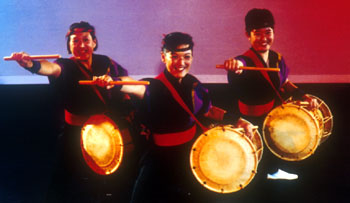![[Metroactive Music]](/music/gifs/music468.gif)
[ Music Index | Silicon Valley | Metroactive Home | Archives ]
 Three Become One: San Jose Taiko drums up unity. Rhythmic Healers San Jose Taiko explores community in its spring program By Todd Inoue AS THE shock waves of Sept. 11 ripple beyond the airport check-in counter and arena turnstiles, some arts organizations are rethinking their work and crafting responses to the tragic events. For Japanese-American drum-and-dance troupe San Jose Taiko, the events of last September, along with the group's upcoming 30th anniversary in 2003, have led to a re-examination of its spring Rhythm Spirit concerts. "In preparing for the 30th anniversary, you get reflective of the years gone by," says creative director PJ Hirabayashi. "To think about what it is that keeps us fueled with inspiration and purpose, you have to look at the community." Hirabayashi challenged members of San Jose Taiko to use "community" as a theme for the annual spring shows. Four members--Pam Sakoi, Michael Fienen, Matt Ogawa and Franco Imperial--responded with new works that examine their relationship to family, Japantown and each other. "I want San Jose Taiko to advocate and inspire social change for the better and be more reflective of our own personal actions," Hirabayashi says. "It's the ripple effect. It isn't just playing taiko but more of how we fit in as a bigger part of the picture." Sakoi's Kansha opens with the sound of a subdued chorus and bells chiming. The beats rumble in, and the listener is whisked on a journey through Sakoi's rhythmic remembrance of her late parents. "I wanted to write things in [3/4 time]--sort of a jazz waltz because my mom loved jazz," explains Sakoi. "Dad just sort of fit in. I thought they complemented each other well. Then the piece gets more complex as the family keeps growing." Fienen's Decades was built from an existing piece he and his cousin--an improvisational jazz keyboardist--were collaborating on. It has a verse-chorus arrangement that reflects Western jazz/rock roots but with a world-music perspective, using a josuke drum and other percussive touches. "The idea was to make a piece that couldn't be played alone," he explains. "It requires people to work together and cooperate to play the song." Matt Ogawa's contribution, San Jose Bayashi, has the upbeat feel of a summer festival with drummers performing a modernized Japanese odori dance while keeping beat. As the rhythm speeds up, so does the intensity. Bayashi was inspired by Ogawa's study of Asian American history. The piece is broken up into three parts: immigration, rebuilding and formation of a new community. It starts as a procession of players (the immigration part); then new players simulate the rebuilding with drum solos. "We follow this group of people immigrating over rebuilding a new life and building a new community," says Ogawa. "I wanted people to understand [and] to be thankful for whatever it is that got them over here." Franco Imperial's Arigato opens with the San Jose Betsuin Junior Choir then graduates to a more groove-oriented section with solos and a jam session. The chorale adds a gospel touch and youthful exuberance. "There's a big cute factor with the kids," Imperial admits. "In the opening of the song, there's that solemn respectful gratitude, then [it] shifts toward the end--more celebratory and happy." The remainder of the set is filled with San Jose Taiko favorites like Gendai ni Ikiru, Impulse, Seven Lands and the spirited finale, Oedo Bayashi. When the audience arrives, they'll be welcomed by Japanese bells hanging above the lobby and theater. From the bells hang thoughts about community handwritten by San Jose Taiko the and Junior Choir. "The bell's vibration sound is very much like the taiko," Hirabayashi says. "In Buddhist thought, it's supposed to be like the voice of Buddha or an awakening. The bell has the same purpose--to awaken--and the listener can be moved into action. My hope is that people can feel the sense of community and then leave with the spirit of community." Formed in the San Jose Buddhist Church basement, San Jose Taiko has been a part of Japantown for 29 years. They are based out of the Issei Memorial Building on Fifth Street and play the local Japanese-American street festivals and Day of Remembrance without fail. Onstage, San Jose Taiko shows what a harmonious community can look and sound like. If it inspires others to better their community, family or personal relationships, Rhythm Spirit will have done its job.
San Jose Taiko presents its Rhythm Spirit spring concerts Friday-Saturday (April 26-27) at 8pm and Sunday (April 28) at 3pm at the San José Repertory Theater, 101 Paseo de San Antonio, San Jose. Tickets are $20. (408.367.7266 or www.taiko.org)
Send a letter to the editor about this story via email . [ Silicon Valley | Metroactive Home | Archives ]
|
From the April 25-May 1, 2002 issue of Metro, Silicon Valley's Weekly Newspaper.
Copyright © Metro Publishing Inc. Metroactive is affiliated with the Boulevards Network.
For more information about the San Jose/Silicon Valley area, visit sanjose.com.